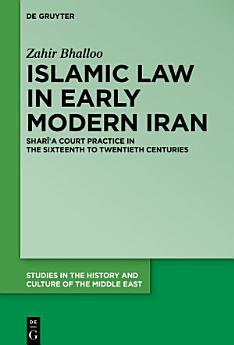Islamic Law in Early Modern Iran: Sharīʿa Court Practice in the Sixteenth to Twentieth Centuries
Oct 2023 · Walter de Gruyter GmbH & Co KG
Ebook
322
Pages
reportRatings and reviews aren’t verified Learn More
About this ebook
Historical studies on the practice of Islamic law (sharīʿa) tend to focus on practice in a Sunni setting during the Mamluk or Ottoman periods. This book decenters Sunni and Mamluk and Ottoman normativity by investigating the practice of sharīʿa in a Twelver Shiʿi Persian-speaking milieu, in early modern Iran between the sixteenth to twentieth centuries. Drawing on documentary evidence and narrative sources, it reconstructs who the practitioners of Islamic law were, how they authenticated, annulled, and archived legal documents, and how they intervened in the resolution of disputes over religious endowments (waqf). The study demonstrates that following Iran's conversion to Twelver Shiʿism under the Safavids, the dominance of Uṣūlī Shiʿi legal theory, which conferred judicial authority on scholars recognized as Shiʿi jurists (mujathids), affected both the practitioners of Islamic law and the procedures of sharīʿa court practice in Iran. Shiʿi jurists in Iran, as a result, would come to exercise by the end of the nineteenth century a judicial monopoly over valid sharīʿa court practice thus laying the foundation for Ayatollah Khomeini's extension, during the Iranian revolution, of the authority of the Shiʿi jurist over political affairs.
About the author
Zahir Bhalloo, Centre for the Study of Manuscript Cultures, Universität Hamburg, Germany.
Rate this ebook
Tell us what you think.
Reading information
Smartphones and tablets
Install the Google Play Books app for Android and iPad/iPhone. It syncs automatically with your account and allows you to read online or offline wherever you are.
Laptops and computers
You can listen to audiobooks purchased on Google Play using your computer's web browser.
eReaders and other devices
To read on e-ink devices like Kobo eReaders, you'll need to download a file and transfer it to your device. Follow the detailed Help Center instructions to transfer the files to supported eReaders.






